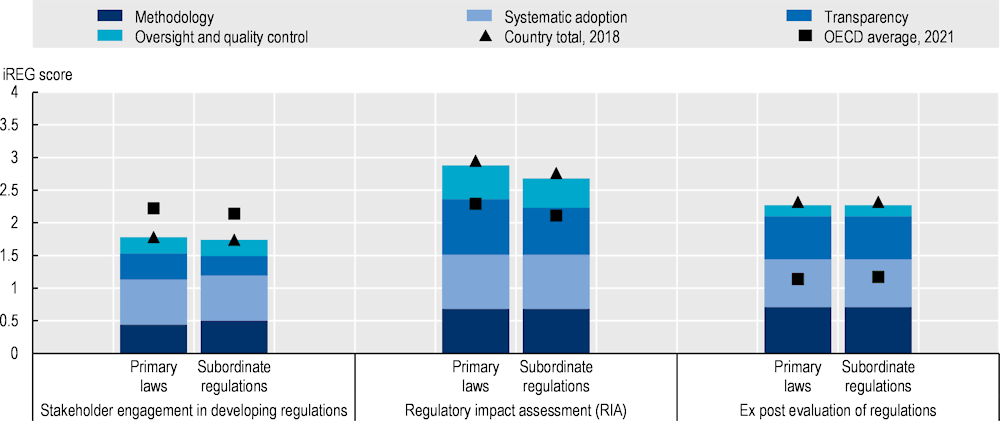Germany has made some improvements to its regulatory policy system over the past years. Since 2018, Germany makes all ongoing public consultations accessible through one central government website building on the Federal Government’s commitment to promote transparency in the legislative process. Regulatory impact assessments, which are mandatory for all laws and regulation, require since 2020 an assessment of the impacts on the equality of living conditions to promote citizen well-being in policy development. The system for assessing impacts of draft legislation ex ante is being complemented by recent efforts to improve the ex post evaluation of legislation. In 2018, the Bureaucracy Reduction and Better Regulation work programme introduced the requirement to publish all evaluations reports online. In November 2019, the Federal Statistical Office established an evaluation support unit for ministries by decision of the State Secretaries Committee on Bureaucracy Reduction.
The Better Regulation Unit (BRU) in the Federal Chancellery is the central co-ordinating and monitoring body for the implementation of the Federal Government’s programme on better regulation and bureaucracy reduction. Its mandate has been broadened to include the evaluation and further strengthening of the ex ante procedure used by the Federal Government to assess, at an early stage, the compliance costs for Germany of planned EU legislation. The National Regulatory Control Council (NKR) operates at arm’s length from government. It reviews the quality of all RIAs, provides advice during all stages of rulemaking, and has responsibilities in administrative simplification and burden reduction. In November 2019, the German government introduced additional requirements for independent quality control of ex post evaluations which the NKR is offering to perform. The Parliamentary Advisory Council on Sustainable Development, in turn, reviews the sustainability checks contained in all RIAs. It examines all legislative proposals and related assessments (for both primary laws and subordinate regulations) of the Federal Government.
Since 2017, all draft regulations are available on ministries’ websites. In addition, all ongoing consultations are accessible through one central government website since 2018 due to the Federal Government’s commitment to promote transparency in the legislative process. Germany also recently made use of green papers, inviting interested parties to submit comments on the government’s draft strategy for moor protection. These initiatives could be a step towards establishing a more systematic approach to involving stakeholders earlier in the development of regulations. While the system to consult with social partners and experts is well established, Germany could open consultations more systematically to the public, release draft impact assessments for public consultation and systematically publish responses to consultation comments online.


 All/■ Always/▲ Yes
All/■ Always/▲ Yes  Major/■ Frequently
Major/■ Frequently Some/■ Sometimes
Some/■ Sometimes Never/▲ No
Never/▲ No